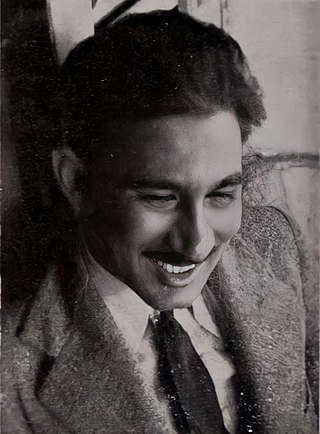
Khwaja Ahmad Abbas was an Indian film director, screenwriter, novelist, and journalist in Urdu, Hindi and English. He won four National Film Awards in India. Internationally, his films won the Palme d'Or at Cannes Film Festival and the Crystal Globe at Karlovy Vary International Film Festival. As a director and screenwriter, he is considered one of the pioneers of Indian parallel or neo-realistic cinema.

Urdu is an Indo-Aryan language spoken chiefly in South Asia. It is the national language and lingua franca of Pakistan, where it is also an official language alongside English. In India, Urdu is an Eighth Schedule language whose status and cultural heritage is recognized by the Constitution of India; it also has an official status in several Indian states. In Nepal, Urdu is a registered regional dialect.

Bahadur Shah II, usually referred to by his poetic title Bahadur Shah Zafar was born Mirza Abu Zafar Siraj-ud-din Muhammad and was the twentieth and last Mughal Emperor of India as well as an Urdu poet. He was the second son and the successor to his father, Akbar II, who died on 28 September 1837. He was a titular Emperor, as the Mughal Empire existed in name only and his authority was limited only to the walled city of Old Delhi (Shahjahanbad). Following his involvement in the Indian Rebellion of 1857, the British exiled him to Rangoon in the British-controlled Burma in 1858, after convicting him on several charges.

Sir Syed Ahmad KhanKCSI was an Indian Muslim reformer, philosopher, and educationist in nineteenth-century British India. Though initially espousing Hindu–Muslim unity, he became the pioneer of Muslim nationalism in India and is widely credited as the father of the two-nation theory, which formed the basis of the Pakistan movement. Born into a family with strong debts to the Mughal court, Ahmad studied the Quran and Science within the court. He was awarded an honorary LLD from the University of Edinburgh in 1889.
Urdu literature is literature in the Urdu language. While it tends to be dominated by poetry, especially the verse forms of the ghazal غزل and nazm نظم, it has expanded into other styles of writing, including that of the short story, or afsana افسانہ. Urdu literature is mostly popular in Pakistan, where Urdu is the national language and India, where it is a recognized language.
Hindustani is one of the predominant languages of South Asia, with federal status in India and Pakistan in its standardized forms of Hindi and Urdu. It is widely spoken and understood as a second language in Nepal, Bangladesh, and the Persian Gulf and as such is considered a lingua franca in the Indian subcontinent. It is also one of the most widely spoken languages in the world by total number of speakers. It developed in north India, principally during the Mughal Empire, when the Persian language exerted a strong influence on the Western Hindi languages of central India; this contact between the Hindu and Muslim cultures resulted in the core Indo-Aryan vocabulary of the Indian dialect of Hindi spoken in Delhi, whose earliest form is known as Old Hindi, being enriched with Persian loanwords. Rekhta, or "mixed" speech, which came to be known as Hindustani, Hindi, Hindavi, and Urdu, also locally known as Lashkari or Lashkari Zaban in long form, was thus created. This form was elevated to the status of a literary language, and after the partition of colonial India and independence this collection of dialects became the basis for modern standard Hindi and Urdu. Although these official languages are distinct registers with regards to their formal aspects, such as modern technical vocabulary, they continue to be all but indistinguishable in their vernacular form.

Babukodi Venkataramana Karanth widely known as B. V. Karanth was an Indian film director, playwright, actor, screenwriter, composer, and dramatist known for his works in the Kannada theatre, Kannada cinema, and Hindi cinema. One of the pioneers of the Parallel Cinema, Karanth was an alumnus of the National School of Drama (1962) and later, its Director. He received the Sangeet Natak Akademi Award (1976), six National Film Awards, and the civilian honor Padma Shri for his contributions towards the field of art.
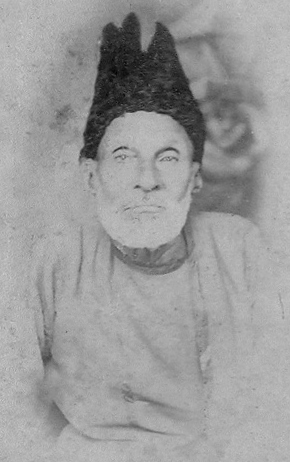
Mirza Beg Asadullah Khan (1797-1868), also known as Mirza Ghalib, was an Indian poet. He was popularly known by the pen names Ghalib and Asad. His honorific was Dabir-ul-Mulk, Najm-ud-Daula. During his lifetime, the already declining Mughal Empire was eclipsed and displaced by the British East India Company rule and finally deposed following the defeat of the Indian Rebellion of 1857; these are described through his work.
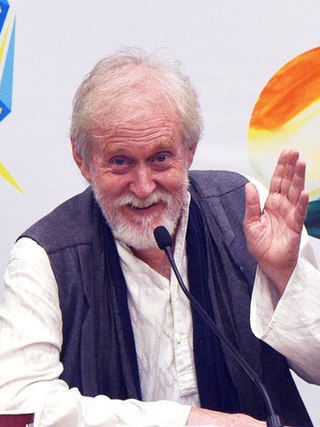
Thomas Beach Alter was an Indian actor. He was best known for his works in Hindi cinema, and Indian theatre. In 2008, he was awarded the Padma Shri by the Government of India.

Theatre of India is one of the most ancient forms of theatre and it features a detailed textual, sculptural, and dramatic effects which emerged in mid first millennium BC. Like in the areas of music and dance, the Indian theatre is also defined by the dramatic performance based on the concept of Nritya, which is a Sanskrit word for drama but encompasses dramatic narrative, virtuosic dance, and music. Historically, Indian theatre has exerted influence beyond its borders, reaching ancient China and other countries in the Far East.

Habib Tanvir was one of the most popular Indian Urdu, Hindi playwrights, a theatre director, poet and actor. He was the writer of plays such as, Agra Bazar (1954) and Charandas Chor (1975). A pioneer in Urdu and Hindi theatre, he was most known for his work with Chhattisgarhi tribals, at the Naya Theatre, a theatre company he founded in 1959 in Bhopal. He went on to include indigenous performance forms such as nacha, to create not only a new theatrical language, but also milestones such as Charandas Chor, Gaon ka Naam Sasural, Mor Naam Damad and Kamdeo ka Apna Basant Ritu ka Sapna.

DD Metro also known as DD 2 was an Indian free-to-air television channel. It was launched in 1984 as DD2 in Delhi as an alternative to DD National. Later, it increased its coverage area by expanding to Mumbai, Kolkata and Chennai. In 1993, the channel was rebranded as DD-2 Metro. On 3 November 2003, the Prasar Bharati Corporation replaced DD Metro with their new news channel, DD News.
Sahir Hoshiarpuri, born Ram Parkash Sharma was an Urdu poet from India. He wrote several poetry books; his main form was ghazal. Moreover, his several ghazals have been sung by leading singers including Jagjit Singh.
Hindi theatre is theatre performed in the Hindi language, including dialects such as Braj Bhasha, Khari Boli and Hindustani. Hindi theatre is produced mainly in North India, and some parts of West India and Central India, which include Mumbai and Bhopal. Hindi theatre has its roots in the traditional folk theatre of North India, like Ram lila and Raslila, and also influenced by distant Sanskrit drama. Starting with Bhartendu Harishchandra in the late 19th century and subsequent playwrights like Jaishankar Prasad, Mohan Rakesh, Hindi theatre came of age in the 1940s and 50s, when IPTA movement created a new brand of theatre practitioners in Hindi speaking areas, especially with IPTA Mumbai, Prithvi Theatres of thespian Prithviraj Kapoor, and theatre artiste Habib Tanvir, paving way for next generation of artists who came out once National School of Drama, Delhi started functioning in 1959.
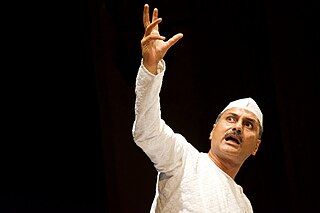
Mahmood Farooqui is an Indian writer, performer and director. He specializes in a type of story-telling known as Dastangoi. Farooqui along with his uncle Shamsur Rahman Faruqi, noted Urdu poet and literary critic, revived Dastangoi, the ancient art of Urdu story telling. He was awarded the Ustad Bismillah Khan Yuva Pursakar in 2010 for it.
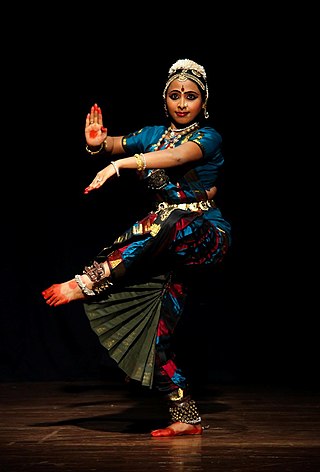
Murugashankari Leo is an accomplished Bharatanatyam artiste, teacher of Bharatantyam, theatre actor and research scholar. Bharatantyam is an ancient Indian classical dance form which is known for its beauty, grace and uniqueness. Murugashankari performs this art form Bharatanatyam, and has given many recitals across India and other countries. She runs an institution Kalai Koodam – Academy of Performing Arts in Chennai and Madurai, where training in Bharatanatyam is imparted. She is also trained in Carnatic music and Nattuvangam.

Mrityunjay Kumar Prabhakar is an Indian playwright, theatre director, theatre critic, poet, Assistant Professor of Drama and Theatre Art at Visva-Bharati University in Santiniketan, West Bengal and the recipient of Bihar Kala Samman by the government of Bihar in 2012. Practicing theatre and drama since a young age, he has been hailed for his socio-political narratives and minimal stage design.

Raj Bisaria is an Indian director, producer, actor and educationalist, described by the Press Trust of India as "the father of the modern theatre in North India". He founded Theatre Arts Workshop in 1966, and Bhartendu Academy of Dramatic Arts in 1975 and the repertory company of Bhartendu Academy of Dramatic Arts in 1980. He has blended artistic concepts of the East and the West, and the traditional and the modern.
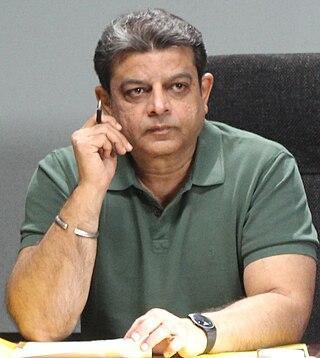
Vinay Varma is an Indian actor, script writer, and casting director who primarily works in Telugu and Hindi films.

Syed Sahil Agha Born: 1984 is a writer, author, and storyteller from New Delhi, India who specialized in the verbal art of dastangoi.
















